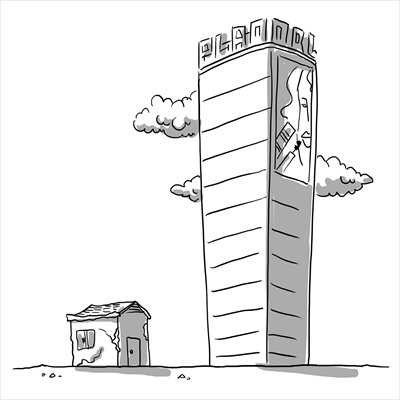Uneven development stifling Myanmar

Illustration: Liu Rui/GT
Anyone arriving today at Mingaladon Airport and driving toward the center of Yangon would find it hard to imagine that just a few years ago Myanmar was an isolated country - poor, underdeveloped and labeled by the US as an "outpost of tyranny."
At the start of the 21st century there were few cars on the roads. Taxis at that time used to be over a decade old, often with sagging seats and doors that did not shut properly. As things started to change around 2005, there were more cars and the first few mobile phones had made an appearance.
Now however, there are traffic jams, increased by the infrastructure construction frenzy that tries to simultaneously create large condominiums and malls for the new middle classes, as well as flyovers and larger roads for the accompanying cars.
Rumor has it that the authorities in Yangon have threatened to move all schools out of the center of the city, so fed up they are with the onslaught of cars at the end of the school day when Yangon residents pick up their children in new SUVs or Korean limousines, with long lines of cars blocking the roads.
Welcome to the new Myanmar. Here, businesses are thriving, multinational and international companies are competing for the best opportunities, and tourists are falling over each other to pay $200 or more for un-renovated hotel rooms.
Communications and power supplies have also vastly improved. Even the house help now has a mobile phone and the electricity supply has become more reliable.
Most tourists will see little more than Yangon, possibly Bagan and Mandalay. Bagan remains the tourist destination of choice and is kept like an open air museum. Mandalay has been rich for decades due to Chinese investments that started in the 1990s.
Few will venture beyond these well trodden paths and consequently most leave with an impression that Myanmar is now prospering. However, despite the shining new commercial hub that is Yangon, the rest of the country is not moving at the same pace.
In essence, the rest of the country can be divided into three categories: the border states where there is peace, and increasing prosperity, the border areas where there is conflict (the northern Shan and Kachin states) where life for many is in camps for displaced people, and the rural center of the country, that was always quite poor, but looks even poorer now that Yangon boasts growing consumer middle classes.
Policymakers speak of special economic zones that will create jobs, but the dry zone and the heart of the country see little investment, and little change to their power supplies. Life in the rural areas is harder than ever, as inflation has made all basic commodities more expensive.
Some of the rural issues have been made into parliament, spearheaded by MPs concerned for their constituents, most prominently the issue of land ownership.
Land grabs in particular are making headlines, as land in the rural areas is the basis for the rice economy that, as in the past, made the country rich.
Land grabs are also an issue in urban areas where poorer populations find themselves moved forcibly to make space for infrastructure development. Protesters against land grabs have found themselves arrested, prosecuted or otherwise harassed, despite the improved environment for protests in Myanmar.
Needless to say, those who are being forced out of homes at remote rural areas find it even harder to fight against this, as they do not have access to local NGOs who help those in the cities.
The biggest long-term challenge that the country faces today is the growing gap between rich and poor, and the gap between the urban and rural populations. Those who have little now face the threat of losing it all in light of the land seizures.
While the Myanmar Peace Center labors toward the first national cease-fire agreement the country has ever seen, a new rift is being created, not by design but by neglect. Ethnic peace is needed to move the country forward, but so is inclusive development that protects the rights of the poorer sections of society.
To date, the parliament has not yet tabled a rural development bill. Given the presidential priority of economic reforms, the needs and aspirations of 70 percent of the country should not be forgotten.
The changes Myanmar are undergoing are remarkable. Previously there were no MPs who could bring the concerns of the people to a parliament. Now that there is a democratic system in place, it has to be used to bring forward the concerns and problems faced by the majority of Myanmar citizens - those requiring inclusive economic growth and the trickle-down effect.
The author is a South Asia expert with the Yangon-based Myanmar Egress, a non-profit organization founded by Myanmar scholars and social workers. opinion@globaltimes.com.cn